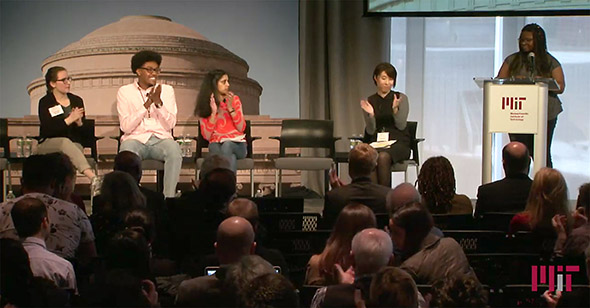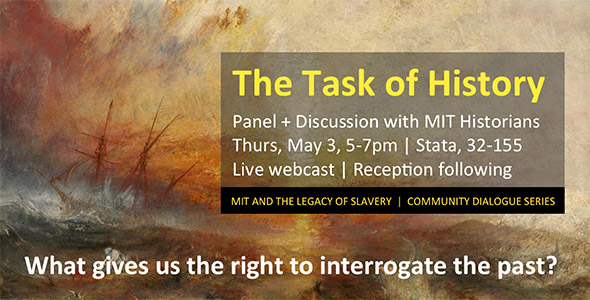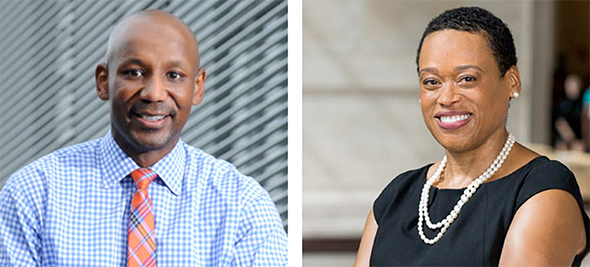MIT and the Legacy of Slavery
Stories, Videos, Community Dialogue Events

“I believe the work of this class is important to the present — and to the future. What can history teach us now, as we work to invent the future? How can we make sure that the technologies we invent will contribute to making a better world for all?"
— L. Rafael Reif, President of MIT
About the project
Project catalyzed by President Reif. The first class of the "MIT and Slavery" (21H.S01) undergraduate research project took place in the Fall of 2017. Set in motion by MIT President L. Rafael Reif with SHASS Dean Melissa Nobles, the course was developed and taught by Craig Steven Wilder, the Barton L. Weller Professor of History, and the nation’s leading expert on the links between universities and slavery, in collaboration with Nora Murphy, the MIT Archivist for Researcher Services.
Letter from MIT President L. Rafael Reif
Initial findings. The initial class findings include, among others: insights about MIT's role in the post-Civil War era of Reconstruction; examples of racism in the culture of the early campus; and the fact that MIT’s founder, William Barton Rogers, owned six enslaved people in Virginia before he moved to Massachusetts in 1853. Detailed findings will be published on the project website after the Spring 2018 class.
Story about the initial research findings | MIT and Slavery project website
New lines of research. The findings also suggest new lines of research. In a focus on these areas, MIT seeks to contribute to the larger national conversation about the legacies of slavery and to lead research on the relationship between the slave economies of the Atlantic world, the fields of science and engineering, and US technical institutions. As part of this effort, Professor Wilder is organizing a consortium of US technical and science institutions to explore such research in collaboration.
Community dialogue. As the "MIT and Slavery" research class continues, MIT has also launched a Community Dialogue series "to explore together how to address these new dimensions of our past" and to tell a more complete version of MIT history. This project, MIT and the Legacy of Slavery, is led by Melissa Nobles, Dean of the School of Humanities, Arts, and Social Sciences. The first dialogue event, The Early Findings, was held Feburary 16, 2018, and the second, The Task of History, took place on May 3, 2018.
Story about The Early Findings event | Story about the Task of History event
Previous Publications and Community Dialogue Events
3 May 2018 | An MIT Community Dialogue
The Task of History
MIT historians on the power of historical knowledge to make a better world
Story by SHASS Communications + Video of the event
Responding to questions that MIT community members have asked about the "MIT and Slavery" project, four MIT historians — Lerna Ekmekcioglu, Malick Ghachem, Tanalis Padilla, and Craig Steven Wilder — shared insights on how understanding the past can be a powerful tool for shaping the future. Moderated by Melissa Nobles, professor of political science and Dean of the School of Humanities, Arts, and Social Sciences.
Detail, The Slave Ship, J.M.W.Turner, 1840; Museum of Fine Arts Boston
3 May 2018
3 Questions with Dean Melissa Nobles and Professor Craig Steven Wilder
A community dialogue series is underway as multi-year research continues. The dialogues are an opening chapter in MIT's commitment to researching this history and making it public. A series of events will create campus-wide and community-wide opportunities for shared discussions of the findings and our responses. The first event in this process was held in February, and the second, The Task of History, took place on May 3, 2018.
Interview by SHASS Communications

Craig Steven Wilder, Barton L. Weller Professor of History; Melissa Nobles, Professor of Political Science and Kenan Sahin Dean, MIT School of Humanities, Arts, and Social Sciences
16 February 2018 | MLS Community Dialogue
Reviewing the Early Findings
Students bring MIT into national conversation about universities and the legacy of slavery.
Story by SHASS Communications
"History burdens all of us, and part of what it means to be in a community is that we share each other’s burdens. Given the nature of the MIT community, my expectation and my hope is that we will see this exploration as a shared responsibility to understand what the discoveries mean to us as individuals, and for the institution as a whole.”
— Melissa Nobles, Professor of Political Science; Kenan Sahin Dean, MIT School of Humanities, Arts, and Social Sciences
12 February 2018 | Video: MIT and the Legacy of Slavery
Research class reveals, explores MIT's connections to the institution of slavery.
Letter from MIT President L. Rafael Reif | Story at MIT News | Video
©2018 MIT School of Humanities, Arts & Social Sciences; Producers: Emily Hiestand, Joe McMaster; Editor: Jean Dunoyer
“MIT is part of a larger exploration of the ties between American universities and slavery, but we are not just participating, we are also leading a part of it. We are leading the research about the relationship of technology and science to the institution of slavery — not only to better understand our own history, but to fulfill our role as an elite university and to help build our role for the 21st century.”
— Craig Steven Wilder, Barton L. Weller Professor of History
Suggested links
Media and Resources Collection: MIT and the Legacy of Slavery project
Video: MIT and the Legacy of Slavery
MIT SHASS story: Event explores initial findings from “MIT and Slavery” class
MIT News Story: MIT class reveals, explores Institute's connections to slavery
Ebony and Ivy, by Craig Steven Wilder
Project website: MIT Libraries
Stories: MIT News (Peter Dizikes), and MIT SHASS Communications
Event videos: MIT Video Productions
MIT & The Legacy of Slavery video: Producers: Emily Hiestand and Joe McMaster; Editor: Jean Dunoyer
Collateral materials: SHASS Communications
Event planning: MIT Events; MIT News Office; MIT Alumni Association; Office of the Dean, MIT SHASS
Media relations: Kimberly Allen, MIT News Office
MIT and the Legacy of Slavery Community Dialogues: Led by Dean Melissa Nobles; Planning group: Craig Steven Wilder, Nora Murphy, Kirk Kolenbrander, DiOnetta Jones Crayton, Kimberly Allen, Martha Eddison, Sarah Gallop, Brian Geer, Kim Haberlin, Emily Hiestand, Helen Elaine Lee, Casear MacDowell, Robin Palazzolo